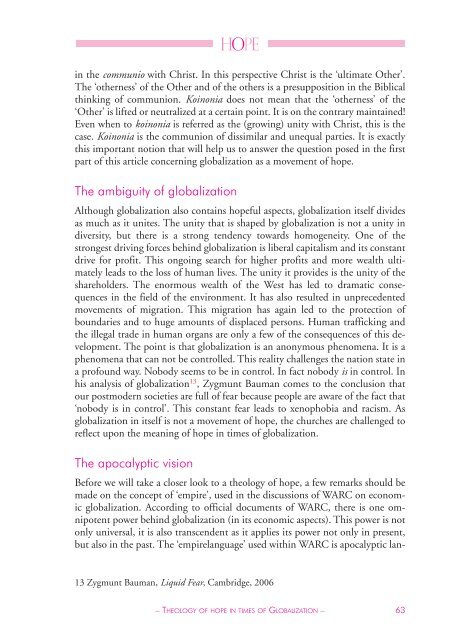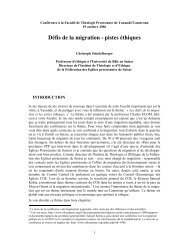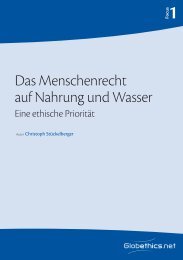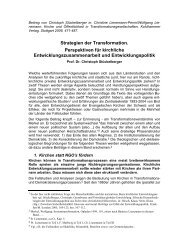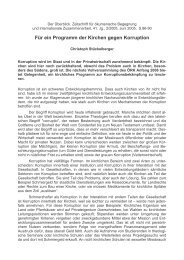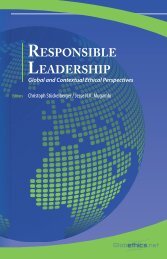BREAK THE CHAINS OF OPPRESION AND THE YOKE OF ...
BREAK THE CHAINS OF OPPRESION AND THE YOKE OF ...
BREAK THE CHAINS OF OPPRESION AND THE YOKE OF ...
You also want an ePaper? Increase the reach of your titles
YUMPU automatically turns print PDFs into web optimized ePapers that Google loves.
in the communio with Christ. In this perspective Christ is the ‘ultimate Other’.<br />
The ‘otherness’ of the Other and of the others is a presupposition in the Biblical<br />
thinking of communion. Koinonia does not mean that the ‘otherness’ of the<br />
‘Other’ is lifted or neutralized at a certain point. It is on the contrary maintained!<br />
Even when to koinonia is referred as the (growing) unity with Christ, this is the<br />
case. Koinonia is the communion of dissimilar and unequal parties. It is exactly<br />
this important notion that will help us to answer the question posed in the first<br />
part of this article concerning globalization as a movement of hope.<br />
The ambiguity of globalization<br />
Although globalization also contains hopeful aspects, globalization itself divides<br />
as much as it unites. The unity that is shaped by globalization is not a unity in<br />
diversity, but there is a strong tendency towards homogeneity. One of the<br />
strongest driving forces behind globalization is liberal capitalism and its constant<br />
drive for profit. This ongoing search for higher profits and more wealth ultimately<br />
leads to the loss of human lives. The unity it provides is the unity of the<br />
shareholders. The enormous wealth of the West has led to dramatic consequences<br />
in the field of the environment. It has also resulted in unprecedented<br />
movements of migration. This migration has again led to the protection of<br />
boundaries and to huge amounts of displaced persons. Human trafficking and<br />
the illegal trade in human organs are only a few of the consequences of this development.<br />
The point is that globalization is an anonymous phenomena. It is a<br />
phenomena that can not be controlled. This reality challenges the nation state in<br />
a profound way. Nobody seems to be in control. In fact nobody is in control. In<br />
his analysis of globalization13 � � , �Zygmunt Bauman � comes � to the conclusion that<br />
our postmodern societies are full of fear because people are aware of the fact that<br />
‘nobody is in control’. This constant fear leads to xenophobia and racism. As<br />
globalization in itself is not a movement of hope, the churches are challenged to<br />
reflect upon the meaning of hope in times of globalization.<br />
The apocalyptic vision<br />
HopE<br />
Before we will take a closer look to a theology of hope, a few remarks should be<br />
made on the concept of ‘empire’, used in the discussions of WARC on economic<br />
globalization. According to official documents of WARC, there is one omnipotent<br />
power behind globalization (in its economic aspects). This power is not<br />
only universal, it is also transcendent as it applies its power not only in present,<br />
but also in the past. The ‘empirelanguage’ used within WARC is apocalyptic lan-<br />
13 Zygmunt Bauman, Liquid Fear, Cambridge, 2006<br />
�����������������������������������������<br />
� � � � � � � ���������������<br />
�<br />
– <strong>THE</strong>OLOGY <strong>OF</strong> HOPE IN TIMES <strong>OF</strong> GLOBALIZATION – 63


